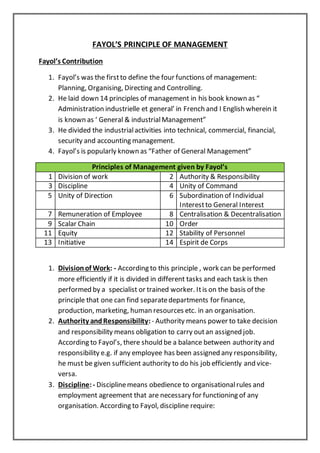
Fayol's princciple of management
- 1. FAYOL’S PRINCIPLE OF MANAGEMENT Fayol’s Contribution 1. Fayol’s was the firstto define the four functions of management: Planning, Organising, Directing and Controlling. 2. He laid down 14 principles of management in his book known as “ Administration industrielle et general’ in French and I English wherein it is known as ‘ General & industrialManagement” 3. He divided the industrialactivities into technical, commercial, financial, security and accounting management. 4. Fayol’s is popularly known as “Father of General Management” Principles of Management given by Fayol’s 1 Division of work 2 Authority & Responsibility 3 Discipline 4 Unity of Command 5 Unity of Direction 6 Subordination of Individual Interestto General Interest 7 Remuneration of Employee 8 Centralisation & Decentralisation 9 Scalar Chain 10 Order 11 Equity 12 Stability of Personnel 13 Initiative 14 Espirit de Corps 1. Divisionof Work: - According to this principle , work can be performed more efficiently if it is divided in different tasks and each task is then performed by a specialist or trained worker. Itis on the basis of the principle that one can find separatedepartments for finance, production, marketing, human resources etc. in an organisation. 2. Authority andResponsibility:- Authority means power to take decision and responsibility means obligation to carry outan assigned job. According to Fayol’s, there should be a balance between authority and responsibility e.g. if any employee has been assigned any responsibility, he must be given sufficient authority to do his job efficiently and vice- versa. 3. Discipline:- Disciplinemeans obedience to organisationalrules and employment agreement that are necessary for functioning of any organisation. According to Fayol, discipline require:
- 2. Good Supervision atall the levels of management Clear and fair agreement Application of penalties judiciously. 4. Unity of Command: - According to this principle an individual employee should have only one superior from whom he should receive order and to whom he should be responsible. If an employee receives orders from more than one person at a time it creates confusion and conflict. Thus principle of unity of command avoids confusion and leaves no option for conflicts on the part of employee. 5. Unity of Direction:- According to this, activities having the common goal must haveone head and one plan. This helps in bringing unity of action and coordination in an organisation. 6. Subordinationof Individual Interest toGeneral Interest:- According to Fayol, organisationalinterest should be given morepriority as compared to individual interest of an employee. An organisation has its own objective while an individual worker has his own individual interest for working in a company. The interests of the group mustsupersedethat of the individual. 7. Remunerationof Employees:- According to this principle, the remuneration payableto the employees should be fair to both employees and the employer. The employee should get fair wages which ensureat least a reasonablestandard of living. On the other hand, it should also be within the paying capacity of the business. In short, overall pay and compensation payable to workers should befair and equitable. 8. CentralisationandDecentralisation:- According to Fayol’s thereis a need to balance subordinateinvolvement through decentralization with manager’s retention of final authority centralisation. A company must be properly balanced i.e. it should neither be completely centralized nor decentralized. Centralisation is the process of the concentration of power of decision making with one person while decentralisation means dispersalof power of decision making among more than one person. 9. Scalar Chain: - According to Fayol’s Organisation should havea chain of authority and communication that runs from top to bottom and should be followed by managers and the subordinate. Scalar chain refers to the
- 3. formallines of authority from highest rank to the lowestrank. The principle of scalar chain suggests that there should be a clear line of authority from top to bottom, linking superiors and subordinates atall levels. The scalar chain serves as a chain of command as well as communication. 10.Order:- According to Fayol’s people and material must be in suitable places at appropriatetime for maximum efficiency. The principle of order is concerned with proper arrangements of things and placement of people. The order can be following types: Material Order:- Arrangementof things is called material order. It ensures proper and fixed place for various materials, tools and equipment’s. Social Order:- Arrangements of peoples is referred to as social order. Itensures proper and fixed place or seat/ cabin etc. for each employee in an organisation. 11.Equity:- According to Fayol’s good senseand experience are needed to ensurefairness to all employees who should be treated as fairly as possible. This principle states that managers should be kind and fair towards their workers. All workers should betreated alike and there should be no discrimination on the basis of sex, religion, caste, belief etc. All employees should be treated equally & impartially. 12.Stability of Personnel:- According to Fayol’s employee turnover should be minimized to maintain organisational efficiency. In an organisation the employees should be selected and appointed after following a due and rigorous procedure. Oncethey are appointed they should be kept at their positions for a minimum fixed period. According to this principle, worker should havestability of tenure and should be given sufficient time to show their performance. 13.Initiative:- According to Fayol’s worker should beencouraged to develop and carry outtheir plans for improvement. Initiatives refer to the firststep taken by the employees towards their self-motivation. This principle states that employees at all levels should be give freedom to some extent so that they can come forward and usetheir skills to achieve expected goals.
- 4. 14.Espirit de Corps:- According to Fayol’s Management should promote a team spiritof unity and harmony among employees. In order to achieve organisationalobjectives, management should promote team work and coordination. The feeling of ‘I’ should be replaced with ‘We’ in the managers while having a conversation with the worker. Espiritde corps refers to team spiriti.e. harmony in work group and mutual understanding among workers.
